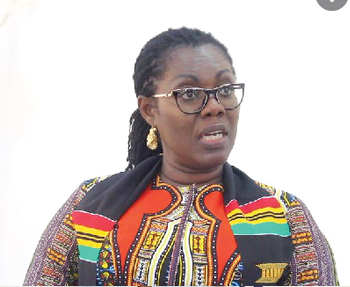Ghana News | Ghana Elections | Breaking News in Ghana

Gender digital disparity developmental concern — Minister
The Minister of Communications and Digitalisation, Mrs Ursula Owusu-Ekuful, says the gross under-representation of girls in science, technology, engineering and mathematics (STEM) is not just an educational challenge but a developmental concern.
She made particular reference to a 2017 UNESCO report titled "Cracking the code: Girls’ and women’s education in STEM", which estimated that only 35 per cent of STEM students in higher education globally were women and differences were observed within STEM disciplines and specific countries.”
"The picture is even more worrying when it comes to information and communication technology. It is estimated that only three per cent of female students in higher education opt for information and communication technology (ICT) studies, which also means women make up just a fraction of the workforce in these STEM related fields. It is also estimated that women hold just 24 per cent of all jobs in the digital economy as of 2018 and the statistics have not changed," she added.
Mrs Owusu-Ekuful made this known at the 75th anniversary of the St Monica's Old Students Association (SMOSA) in Accra on the theme: “Educating girls in the world of technology”.
She stressed the need to bridge the digital gender disparity, especially in the era where technology drove everything and STEM careers were the jobs of the future, driving innovation, social wellbeing, inclusive growth and sustainable development.
"Nation building requires the contribution of all, and technology is the key driver of growth and economic and social transformation in the recent history of the world. The COVID-19 pandemic has taught us that even though we see prospects, the digital revolution is revealing an under-representation of women in terms of contributing to this transformation", she noted.
Key interventions
The minister indicated that the government, through the Ministry of Education, complemented by the ministry over the years, had sought to remedy the situation by introducing some interventions targeting access, STEM, gender, application of ICT and administrative arrangements.
Mrs Owusu-Ekuful said in spite of those interventions, women were still under-represented in STEM activities and there was still a wide digital gender gap, and to address it, there was a need to increase access to the internet by investing in infrastructure to extend coverage in underserved areas, increase levels of digital literacy through ICT education and ensure online safety by intensifying awareness creation.
Role of ministry
On the role of her ministry, Mrs Owusu-Ekuful said the world was technology-driven and "we are transitioning to a virtual way of living. Our ability to adapt to innovative ways of doing things is essentially important to our survival.”
The ministry, she said, was poised to facilitate the adoption and use of technology in all sectors of the economy, including education, as part of the digital transformation agenda to engender efficiency, improve productivity and facilitate growth.
Intervention
The minister noted that digital adoption and use could also offer women and girls opportunities to overcome hurdles they might face in the physical world, adding that digital access could empower women and girls, help expand their sense of self in the world, increase civic engagement and raise awareness of their rights.
"It will also facilitate flexible working hours, enabling women to combine their care-giving roles and careers effectively, working from home with digital platforms," she said.
Mrs Owusu-Ekuful encouraged girls to take an interest in technology, saying it was important to remind everyone that several risks were associated with digital technology, including online harassment from strangers (such as unsolicited messages), cyber-bullying, cyber stalking, unsolicited sexual messages or images, non-consensual sharing of intimate ideas, child sexual exploitation and abuse, as well as data security and privacy risks.


